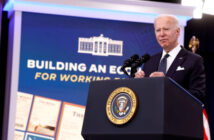By Tashi McQueen
AFRO Staff Writer
tmcqueen@afro.com
Tipped employees and One Fair Wage, a national advocacy organization, presented the Baltimore City Council with a 400-signature petition in supporting the Fair Wages for Tipped Employees bill on Aug. 26.
The proposed legislation would gradually implement a $15 minimum wage for tipped workers. Employers are currently only required to pay tipped employees $3.63 per hour under state law.
Councilman John T. Bullock (D-District 9)
“The reason why I support it, as well as others, is because I believe it’s the right thing to do,” said Councilman John T. Bullock (D-District 9), the main bill sponsor. “It’s about fairness, it’s about equity predictability in terms of wages.”
Ebony Battle, a waitress, talks about how the bill would benefit her.
“I wouldn’t have to wonder if I’m going to make ends meet every single weekend,” said Battle, 28.
Right now, Battle says she is often “not sure if I’ll be able to pay my rent or eat food.”
Battle emphasized the need for everyone to have access to the bare necessities of life.
“We should have universal basic income and everybody should have access to housing,” she said. “At $3 an hour, that’s not possible.”
Though Bullock says there is support among his colleagues for the initiative, one group has met with council members advocating against the bill.
“The Restaurant Association of Maryland strongly opposes Baltimore City legislation that would eliminate the tip credit, because of the negative consequences it would have on tipped employee earnings, restaurants and customers,” said Melvin Thompson, senior vice president of Government Affairs and Public Policy at the Restaurant Association of Maryland, a non-profit advocacy organization.
According to Innessa M. Huot, an employment attorney, a tip credit allows restaurants to pay employees less than the minimum wage as long as they earn enough tips to bring them over the minimum wage.
Thompson claims that “tipped employee earnings would significantly decrease” as a result of the increased minimum wage because restaurants would turn to service charges to cover the higher labor costs.
“Customers are unlikely to tip on top of service charges,” he said.
Thompson also said restaurant operators may raise menu prices and eliminate jobs to accommodate the new requirement.
The Congressional Budget Office, a nonpartisan organization, found that if the federal minimum wage, which is currently $7.25 an hour, was increased it would raise family income and earnings for most low-wage employees. Though it would give some tipped employees the chance to overcome poverty, it would leave others jobless due to higher labor costs.
Bullock introduced the fair wage bill on June 24 and hopes there will be a hearing within the next few weeks in the Ways and Means Committee.



